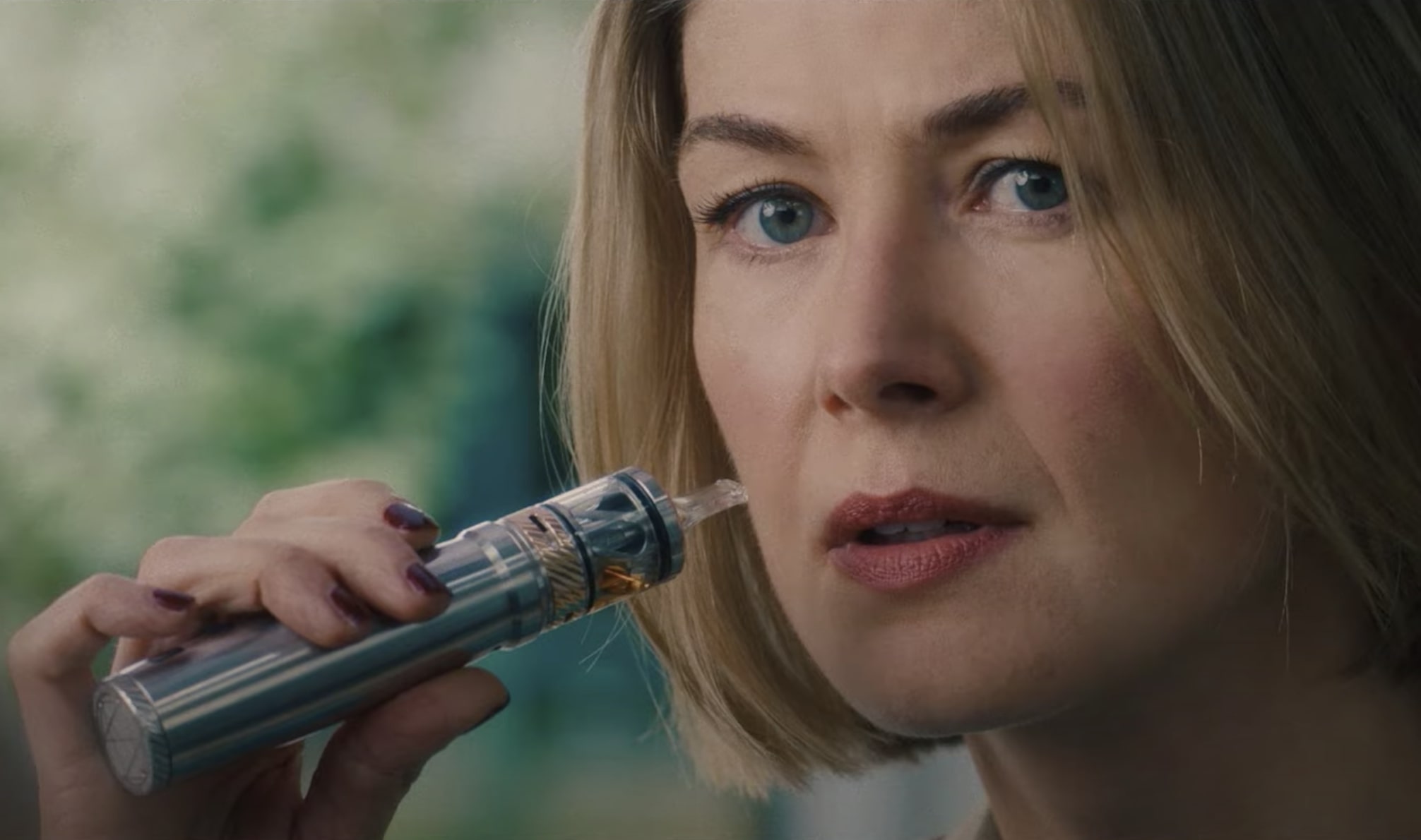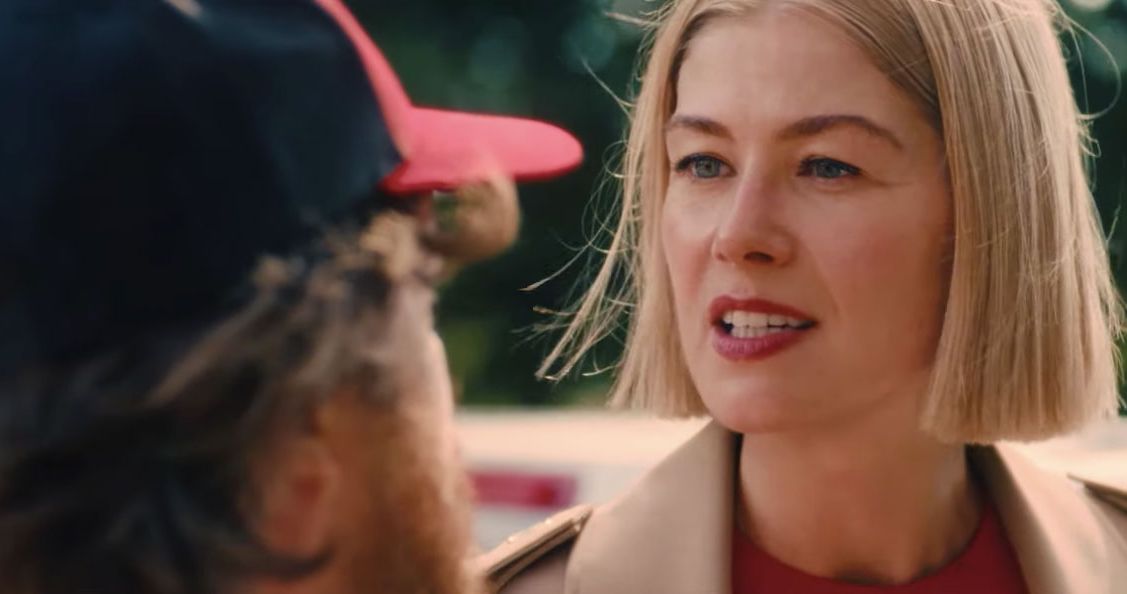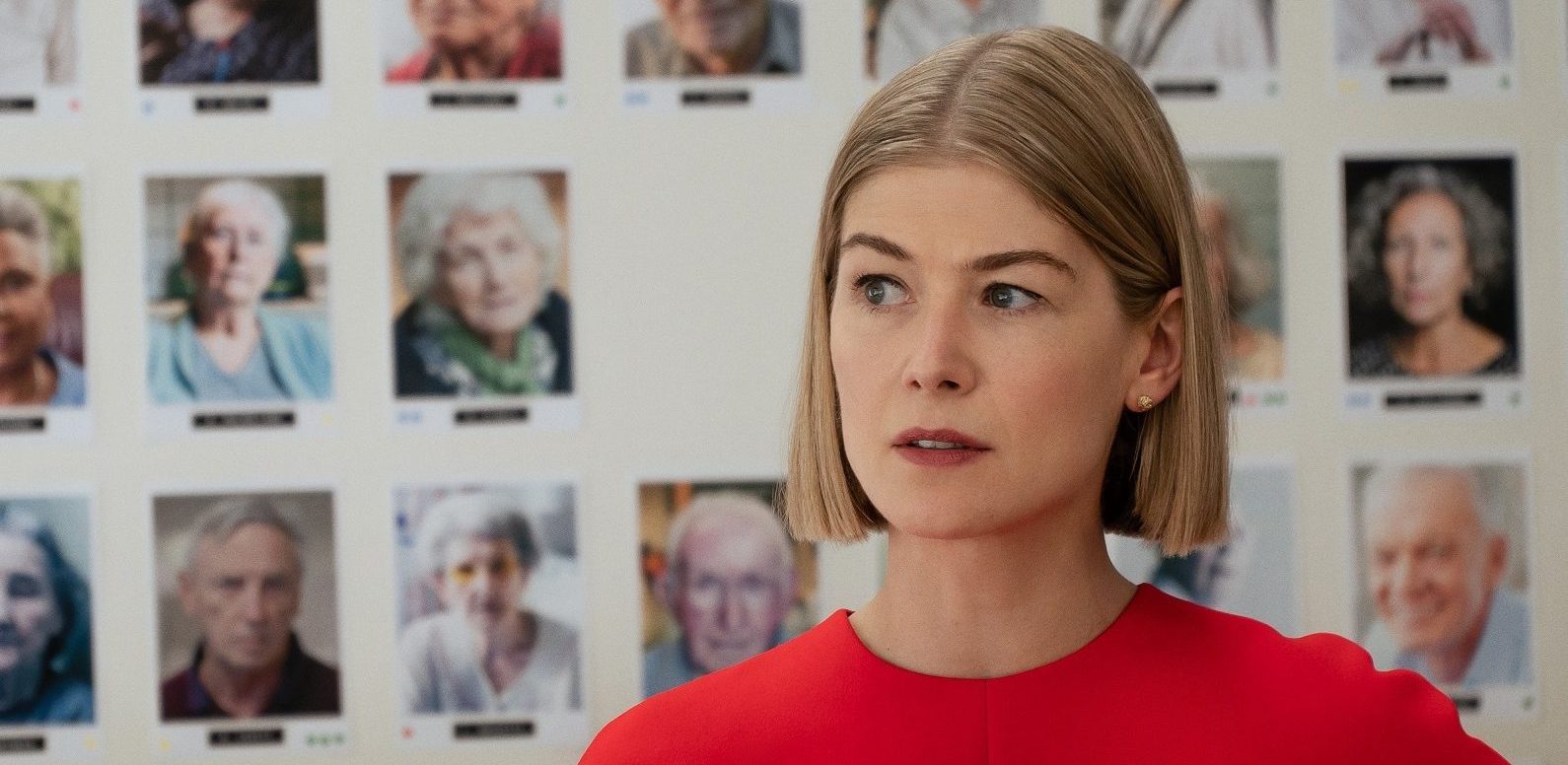About 10 minutes into ‘I Care a Lot,’ J Blakeson’s (‘The Disappearance of Alice Creed’) preposterously unsettling dark comedy, you already hate the guts of the film’s protagonist, Marla Grayson (Rosamund Pike). A self-proclaimed lioness, Grayson resonates with all the essential qualities of late capitalism. She preys on elderly men and women by sending them to retirement homes and taking over their properties. This continues until she comes across Roman Lunyov (Peter Dinklage), a man who is as much an apex predator as she is. What follows is a clash between two equally vicious and amoral individuals, as each tries to one-up the other.
Blakeson spends the first half demonstrating how ubiquitously realistic the scams that Grayson and her associates pull on their victims can be. But then, the main conflict in ‘I Care A Lot’ is introduced, and the film subsequently embraces the pulp and sensational aspects of the script. As the film progresses towards its ending at a rapid speed, you wonder whether Grayson will ever get her comeuppance. SPOILERS AHEAD.
I Care a Lot Plot Synopsis
The racket that Grayson runs is quite extensive. She has a doctor, Karen Amos (Alicia Witt), who exclusively works with elderly people on her payroll. Every time Amos believes that one of her patients has become too problematic, she offers them on a platter to Grayson. Dressed in designer suits and sporting an almost futuristic bob, Grayson swoops in with a court order in hand and police in tow.
With a smile that never reaches her eyes playing on her lips, Grayson informs her impending victims that the court has made her their guardian before submitting them into overpriced rest homes. These facilities predictably share a symbiotic financial relationship with Grayson. She then gradually dismantles the erstwhile lives of her victims.
She sells their homes, auctions off their belongings, and cleans out their savings, all the while not letting them contact their family, their friends, or their lawyers. Perhaps the most disturbing thing about this con job is that all of it is seemingly real. Over the years, Grayson has built up an image of a kind and generous entrepreneur whose words carry more value on the matters of her victims than the members of their own families. However, this con mostly works in a smaller time frame. The moment her victims pass away, the property and money go to the inheritors.

Grayson is an exceptional swindler who has managed to convince both society and the legal system that what she does is ultimately for the good of her victims. So, when Amos informs her that she (Amos) has found a “cherry,” a prospective target who is wealthy and has no family, Grayson moves in fast for the kill, because after all, even she has her share of competitors. She then proceeds to strip this woman, Jennifer Peterson (Dianne Wiest), of her savings, freedom, and dignity.
However, Grayson and her lover-associate Fran (Eiza González) soon discover that nothing is what it seems with the woman known as Jennifer Peterson. That name originally belonged to a young girl who died decades ago. A sleek lawyer (Chris Messina) shows up and first tries to pay them off with an amount that Grayson deems too little. When that doesn’t work, he resorts to threats.
It isn’t long before the man behind the smokescreen makes his first appearance. Lunyov is articulate, ruthless, and almost as big of a psychopath as Grayson. He is also Peterson’s son. It’s not just his mother that Grayson takes from him. She also steals diamonds worth millions of dollars from a bank vault that he shares with his mother. After exhausting all legal methods, Lunyov embarks on a brutal path to retrieve both his mother and the diamonds.
I Care a Lot Ending: Why Does Lunyov Ask Grayson to Start a Business With Him?
In every sense, Grayson embodies the predatory nature of late capitalism. Her actions are not only terrifyingly legal, but the justice system is also a very willing participant in them. She is remarkably good at working the system, as her entire business model depends on her ability to do so. When Lunyov and his associates go after her through legal methods, she is hardly bothered. This is her home ground, and she knows that they won’t defeat her here. Lunyov quickly realizes this and reluctantly reverts to his Russian mob days, full of violence and intimidation.
The audience members are in a precarious position throughout this film. It’s incredibly easy to hate the protagonist. She makes her living by taking advantage of one of the most vulnerable sections of society. And it’s only natural to see your own parents as victims of such a legalized robbery. When Lunyov comes into the picture, you immediately start rooting for him. It doesn’t matter that he might have committed even worse crimes. Those will always be impersonal as compared to the ones that can be committed to your parents.

Lunyov orders Amos’ death and nearly gets Fran and Grayson killed. But Grayson survives and later saves Fran. She subsequently decides not to run with the diamonds they still have but to go after a man who seems to be a thousand times more powerful than her. At that point in the film, Grayson earns the audience’s grudging admiration for her sheer resilience.
She and Fran somehow manage to carry out their plan flawlessly and place Lunyov at Grayson’s mercy as any one of her victims. This is when Lunyov displays his own propensity for capitalism. Forgoing the bitter rivalry, he proposes that they should take Grayson’s business idea nationwide. Initially stunned, Grayson realizes that with Lunyov’s help, she can achieve more than she ever thought was possible.
Why is Grayson Killed?
In its final act, the film shows how tremendously successful their idea becomes. They equally split the money they get by selling the diamonds. Lunyov gets his mother back, and Grayson and Fran marry. The new avatar of Grayson’s business provides a wholesome package of guardianship. From rest homes to the company that makes the pills given to the residents— Grayson runs them all. She serves as the corporation’s CEO, while Lunyov operates from the shadows. She is at the pinnacle of her success when Feldstrom (Macon Blair) reappears in her life with a gun in hand.
 At the beginning of the film, Feldstrom unsuccessfully takes Grayson to court to earn the right to see his mother. Although the judge is not on Grayson’s payroll, he is evidently more sympathetic towards her and eventually rules in the favor of the defendant. Aside from providing a scathing commentary on capitalism, the film underscores the dangers of American individuality. People like Feldstrom’s mother are always the intended targets of con artists like Grayson.
At the beginning of the film, Feldstrom unsuccessfully takes Grayson to court to earn the right to see his mother. Although the judge is not on Grayson’s payroll, he is evidently more sympathetic towards her and eventually rules in the favor of the defendant. Aside from providing a scathing commentary on capitalism, the film underscores the dangers of American individuality. People like Feldstrom’s mother are always the intended targets of con artists like Grayson.
As the older section of the population strives to be self-sufficient and independent despite their age, the swindlers make the best use of their victims’ self-imposed alienation. Grayson does end up getting her comeuppance at the hands of a man who was a perfect victim until that point. After winning the case, Grayson all but forgets about Feldstrom. As her business expands exponentially, she never learns that Feldstrom’s mother has passed away.
When Feldstrom shows up on that sunny day outside the TV station, Grayson has become the very definition of the American dream. Feldstrom shoots her once in the chest before he is restrained and taken away by the TV station’s security. Grayson dies bleeding on the road, her life ending before she can truly begin to enjoy her success, making her demise quite poetic.
Read More: Best Black Comedies of All Time


You must be logged in to post a comment.